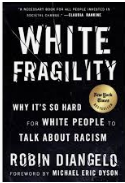I mentioned before that I planned to write an in-depth review of Robin DiAngelo’s book. Now that I have finished the book and have pushed myself to apply the concepts I have learned, I have chosen to not dive into a deep review of the book. Not only do I not have the skills to adequately review the book but I feel like people should experience reading the book themselves rather than a review which adds yet another layer of separation to the experience. Instead, I want to ruminate on how what I have learned has changed me and how this introspection has driven me to seek God even more, to become more like him.
The biggest takeaway I had from the book is the question that DiAngelo recommends using. When I hear something or say something or think something, stop and ask myself “what purpose does this serve in the conversation?” Asking this question causes me to slow down. Instead of jumping to conclusions and becoming defensive, I have to sotp and listen, truly listen, not just hear enough words so that I can jump in and say something for my own benefit.
I think this question resonated so much with me because I struggled so long with breaking my own dependency on defensiveness. So many times in the past I had jumped to defensiveness, assuming that those around me from family to coworkers couldn’t possibly understand my motives. This rush to defensiveness has gotten me in trouble on many occasions leaving me rueful and ashamed. After I react, I reflect on the situation and realize how right the other person was and the uncomfortable position it put me in, thus provoking the defensive response.
I took this question to heart as I listened to those around me both in person and through social media. I listened deeply and reflected on the purpose those statements had in conversation. I saw white fragility weaponized against me though the person writing those words would not recognize it as such.
One scenario unfolded as follows. As I have learned recently, saying things like “all lives matter” or “we all bleed the same color” or even “we’re all equal sinners in God’s eyes” is at the very least tone deaf and potentially extremely hurtful. By saying such things, we discount the hurt inflicted on others because of the color of their skin. A Facebook friend, a former white colleague who now lives in another state posted lyrics to a son by Mandisa, a Black recording artist, titled “Bleed the Same.” I made a brief comment about how that could be misinterpreted at this time since Black people had bled so much more because of the color of their skin. This coworker responded, immediately defensive, claiming that I assumed their motives to which I replied that I simply wanted to share something that had impacted me recently. Purposefully, I worded it that way to best attempt to prevent the defensiveness and provoke potential reflection. This person continued to assume that I spoke to malign their character and proceeded to use several examples of responses produced by white fragility. I read the response with sadness in my heart.
After this encounter, I observed other examples from Christian Facebook acquaintances that prompted more reflection on my part, reflection on how I interpret the concept of white fragility as a Christian, my primary identity. As I read the book, I read it through the frame that I use for my entire life, the truths I have learned from Scripture.
Every human that has ever lived has a sin nature. We cannot create anything besides flawed, broken systems. As I look around me, I see a system that has developed for hundreds of years to benefit a certain group and that the very nature of that system has given me a leg up in many areas of my life. In flawed human terms, the system created inherent benefits for me. I deserve none of that and I need to seek out the ways I try to preserve these benefits that I do not deserve. If I do not, I will remain blinded by the log in my eye, unable to share God’s love with those who need it, all of us.
This fragile response to challenges of this system preserves the sinful human nature which wants to seek that which benefits us. Thus, as I read DiAngelo’s book, a book written from a secular perspective, I took in the insights she shared and compared them to what I know from Scripture, what I described above. When DiAngelo described responses generated by white fragility, I saw the lack of humility and the desire to cling to man’s “truth” rather than God’s truth. It’s this perspective that i have added the “white fragility” filter to.
As time continues to pass and I continue to sit with this concept, I continue to learn and grow in the application. I don’t have all the answers but I continue to thirst for the knowledge. I hope to return to this topic as the weeks progress to share what I have learned and to process through writing.
